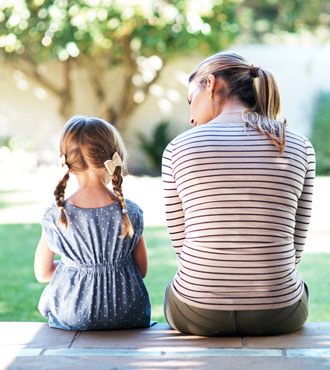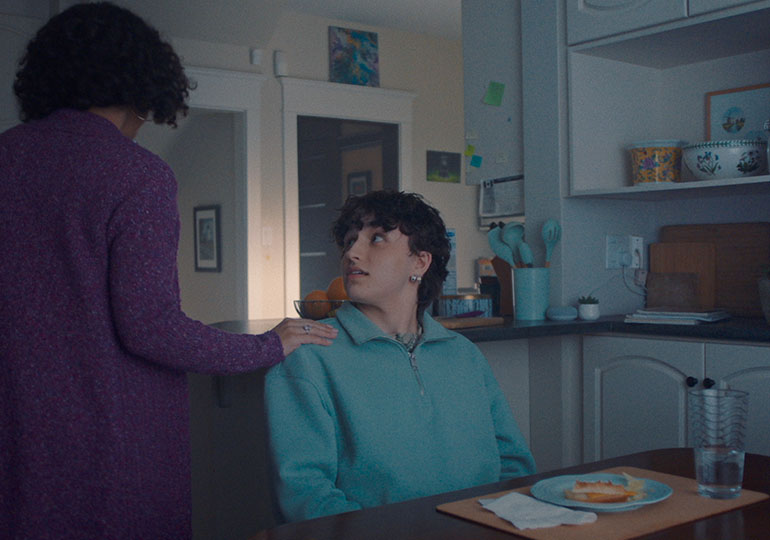Kids Help Phone is here for you during the COVID-19 pandemic. Emergency services and child protection services are still available across Canada and mobile crisis support is also available in some areas. No matter what, your safety is a priority — it’s important to find ways to protect yourself, even while practising physical distancing.
Abuse can be physical, emotional or sexual. Abuse is never OK and it’s never your fault. Your safety matters. While some forms of abuse can be obvious, abuse isn’t always easy to identify – even when it’s happening in your own family.
What is abuse?
Abuse (particularly in the family) is when an adult, typically a parent or caregiver, uses violence to control and/or harm a family member. The abuse can be physical, emotional/psychological or sexual. Neglect is another form of abuse. Neglect is when parents or caregivers who have a responsibility to care for a young person don’t meet their basic needs.
Physical abuse
Physical abuse includes hitting, punching or physically harming a young person in some other way. Other examples of physical abuse include:
- slapping
- biting
- kicking
- pulling hair
- scratching
- shaking
- choking
- arm twisting
- using an object, such as a belt or a bat, to cause pain
Emotional abuse
Emotional abuse, also known as psychological abuse, is when someone threatens, bullies and intimidates another person. It’s harder to recognize than physical abuse. A person experiencing emotional abuse may not realize that they’re being mistreated.
Emotional abuse doesn’t leave physical marks, which can make it harder for other people to recognize. Emotional abuse can be as painful as physical abuse.
Examples of emotional abuse include:
- name calling, insulting and criticizing someone to hurt their feelings
- ridiculing someone
- humiliating a person in public (yelling at someone, pushing them around or speaking down to them in front of others)
- telling someone that they’re a bad person
- giving someone the “silent treatment”
- threatening to hurt a person or someone they care about (or threatening to harm a pet)
- threatening to leave a young person somewhere, or to leave the home and never return
- abusing someone else (sibling, parent or pet) in front of a young person
Sexual abuse
Sexual abuse is when an adult involves a young person in any sexual activity, or uses sexual acts as a way to demonstrate power or authority. Sexual abuse often involves physical contact, but it can also happen without touching.
Some examples of sexual abuse are:
- touching a young person’s genitals or making them touch an adult’s genitals
- having sex or trying to have sex with a young person
- taking off a young person’s clothes or forcing them to watch as an adult takes off their clothes, especially in a sexual way
- making sexual comments about a young person’s body
- forcing a young person to watch others have sex
- making a young person watch pornography
- taking pictures of a young person without clothes on
Neglect
Neglect is when a parent or caregiver fails to meet a young person’s basic needs. Basic needs include:
- a safe place to live and clean, weather-appropriate clothing
- nutritious food
- adequate hygiene (soap, shampoo and a place to bathe)
- supervision and guidance
- education (ensuring that children attend school or receive home schooling)
- emotional support (parent/caregiver talks to their children and shows interest and affection)
- medical care (basic preventative care such as going to the dentist/doctor regularly, trips to the doctor when children are sick, hospital visits for medical emergencies)
It’s important that your needs are met — you deserve to be loved and cared for.
Abuse caused by other family members
Violence can happen in many different family relationships — it’s not always between parents or caregivers and children. If you’re being hurt or abused by someone in your family (e.g. a sibling, cousin, aunt, uncle, grandparent, etc.) you can talk to a safe adult or call Kids Help Phone at 1-800-668-6868 for ways to stay safe and improve your situation.
What’s the difference between discipline and abuse?
In Canada, parents are legally allowed to physically discipline their children from ages two to 12. However, only some kinds of discipline are allowed:
- the discipline must be done in an effort to correct behaviour, rather than to express a parent’s frustration or loss of temper
- the child must be capable of learning from the discipline
- the discipline must not involve the use of objects (sticks, bats, belts or other objects)
- the child must not be hit on the head or slapped in the face
- the discipline must not be degrading, humiliating or harmful (bruises, cuts, scratches and other markings are physical signs of harm)
While physical discipline is legal, child protection services advocates for “positive parenting,” which doesn’t involve any physical discipline.
Wants versus needs
Parents and caregivers are responsible for meeting their child’s needs but not their wants. For example, a warm winter coat is a need, but a trendy winter coat is a want. In other words, parents and caregivers must provide their child with warm winter clothing, but they don’t have to provide their child with the particular coat that they want.
If you have questions about abuse, you can call a Kids Help Phone counsellor at 1-800-668-6868.
Common feelings with abuse
Living with abuse can affect the way you think about yourself, your family and your future. Abuse can trick you into telling yourself stories that are untrue, which can prevent you from getting help.
Abuse can affect the way you feel, too. The emotions caused by abuse can be complicated — you may not be sure what you’re feeling. Here are some examples:
Guilty:
“I know it was at least partly my fault.”
“I should’ve been able to stop it.”
“If only I had helped out more.”
“Why did he hurt my sibling and not me?”
Ashamed:
“It’s so humiliating.”
“People will think I’m weird.”
“Everyone will think it’s my fault for not stopping it.”
“Our neighbours will look down on my family.”
Angry:
“Why me?”
“Nothing ever goes right for me — this just proves it.”
“I must be being punished.”
“I hate everything.”
Afraid:
“If I tell the police, he will hurt me more.”
“Child protection services is going to separate me from my sibling.”
“I’ll be placed in a foster home where things will be even worse.”
“I’ll never find someone to care about me again.”
Confused:
“Maybe the abuse isn’t really that bad.”
“Sure, he’s violent, but he can also be really nice and fun.”
“I know she loves me — she just doesn’t know how to show it.”
“If I don’t tell, things will get better.”
“Maybe I’m remembering things wrong.”
Rejected:
“They may as well have given me away.”
“She must not care about me at all.”
“Why didn’t he try to protect me?”
Trapped:
“It feels like there’s no way out.”
“No matter what I do, she hits me. I can’t escape.”
“I have nowhere else to go — it’s living like this or being homeless.”
“I feel like I’m walking on eggshells all of the time.”
Helpless:
“There’s nothing I can do.”
“No one will believe me — I’m just a kid.”
“How can I stop him? He’s bigger than me.”
“If only I had the money, I’d run away.”
Hopeless:
“It’s going to go on forever — or get worse and worse.”
“I have nothing to look forward to.”
“All I do is try to get through each day.”
Worthless:
“If I was normal, he wouldn’t be doing this to me.”
“I’m so stupid — I can’t please anyone.”
“No wonder she won’t let me in the house — I’m such a mess.”
“I’m ruined forever.”
Betrayed:
“How can they do this to me?”
“He promised me he’d never hit me again — what a liar.”
“She loves using drugs more than she loves me.”
If you’re feeling any of these things, or even if you just feel confused, talking to a safe adult can help. You can also call a Kids Help Phone counsellor at 1-800-668-6868.
Common myths about abuse in the family
Every day in Canada, kids and teens are abused or neglected in their homes.
There are many misconceptions about abuse and neglect, and these can sometimes prevent young people from seeking help.
Myth: “I come from a good family — abuse couldn’t happen to me.”
Truth: violence can happen in any family, neighbourhood or community.
Myth: “I behave really badly sometimes. If my caregivers abuse me, it’s my fault.”
Truth: no one deserves to be abused — no matter what they’ve done.
Myth: “If my parent yells at me and calls me names, it’s not abuse.”
Truth: abuse isn’t just about physical harm. Emotional abuse and neglect are also wrong and against the law.
Myth: “My parents have to hurt me to make me behave.”
Truth: abuse doesn’t make kids behave. In fact, young people who are abused are often scared and angry, which can make their behaviour worse.











